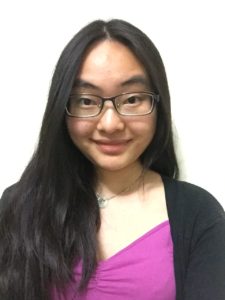 This post was written by Angel Su, who received a Student & New Professional Fellowship to attend the 2019 DLF Forum.
This post was written by Angel Su, who received a Student & New Professional Fellowship to attend the 2019 DLF Forum.
Angel is an Electronic Resources and Metadata Services Intern at the University of Toronto Libraries where she focuses on the enhancement of metadata in bibliographic records to optimize the discoverability of digital collections for users. She is currently pursuing a Master of Information in Library and Information Science and User Experience Design at the University of Toronto’s Faculty of Information. In addition to developing her skills in electronic resource management, user research and interface design, Angel also enjoys pursuing projects in cataloging, usability testing and computer literacy instruction.
DLF Forum 2019: An Educational Experience to Remember
This year, I had the pleasure of attending the Digital Library Federation Forum in Tampa, Florida. With generous support in the form of the DLF Students and New Professionals Fellowship award, I flew to Florida for the first time, excited for three days of knowledge sharing within a welcoming and inclusive community. As a fairly recent newcomer to the world of digital libraries and the DLF community, I arrived at Tampa open to anything and everything there was to learn. I was not disappointed in the least.
Having attended at least a dozen talks in three days, I was intrigued by the theme of embracing new trends and incorporating new technologies into digital libraries to improve workflows and facilitate access. Working at an institution currently undergoing a major migration process, I understand the challenges associated with accepting change and adapting to technological advancements in the work environment. However, while attending several talks on Day 2, I was inspired by how forward-thinking many institutions were in experimenting with new practices and implementing new software into their daily work.
The Practical Python Tools for Metadata Assessment session provided an excellent opportunity to receive hands-on instruction on using python for metadata projects. Although learning to code can often be an intimidating process for people with a less technical background, myself included, the workshop was very inclusive for beginners due to its slower pace and crystal clear instructions. I came out of the session equipped with several handy scripts and more confident in trying python at work myself.
Sessions on machine aided indexing, natural language processing and machine learning demonstrated the potential for machines to help improve productivity and reveal important data about collections. The machine aided indexing talks shed light on the extensive capabilities of APIs, providing insight on how a labor-intensive task like indexing could performed more efficiently with the help of powerful software. With the prevalence of AI in many industries, it was also fascinating to see how machine learning could be applied in libraries as well. The presentations on NLP and machine learning offered interesting cases of the different ways machines can be trained to help with analyzing the contents of collections. It was refreshing to see how APIs and machine learning can serve as assets for library professionals.
University of South Florida’s presentation on linked open data provided a concrete example of how the transition from the MARC bibliographic standard to web semantic data can be achieved by starting with a small, manageable collection and bringing together a team of innovative library staff. Having attended discussions and presentations in the past on the possibilities for library linked data, I greatly enjoyed this presentation for providing practical recommendations for software and procedures that can be taken to make linked open data a reality in libraries.
The DLF Forum was truly a unique educational experience. I was inspired by everyone’s dedication towards preserving our past while embracing new technologies that can allow us to better perform our work. I am also grateful to have met creative and hardworking librarians who took the time to provide mentorship for students and new professionals. Thank you to all the DLF members who made this opportunity possible.
